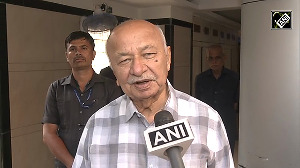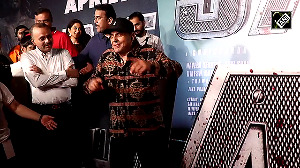 The Supreme Court on Wednesday reserved its verdict on the pleas seeking fresh interpretation of the term 'juvenile' in the statute and leaving it to the criminal court, instead of Juvenile Justice Board, to determine the juvenility of an offender in heinous crimes.
The Supreme Court on Wednesday reserved its verdict on the pleas seeking fresh interpretation of the term 'juvenile' in the statute and leaving it to the criminal court, instead of Juvenile Justice Board, to determine the juvenility of an offender in heinous crimes.
Two petitions, filed by Bharatiya Janata Party leader Subramanian Swamy and parents of the victim of the December 16 gang rape, challenging the constitutional validity of the Juvenile Justice (Care and Protection of Children) Act 2000, were opposed by the Centre.
The victim's father said that the August 31, 2013 verdict of the Juvenile Justice Board was not acceptable to the family and so they are challenging the act as there is no other authority which they can approach for such relief.
He sought a direction to declare as unconstitutional and void the JJA to the extent it puts a blanket ban on the power of the criminal courts to try a juvenile offender for offences committed under the IPC.
His counsel Aman Hingorani submitted that the provisions in the act leave the judiciary a "helpless spectator" to the proceedings of the board which functions merely as a fact finding inquiry body rather than carrying out the trial.
He said "mental and intellectual maturity" of the juvenile involved in the December 16 gang rape has to be taken into account and should be put to trial like the four other accused who have been awarded death sentence.
"Can a person party in the gang not know what he is doing? Can any person under any jurisprudence of any country in such a case say he has no knowledge what he is doing," Hingorani submitted before a bench headed by Chief Justice P Sathasivam.
The petition by the victim's parents said the juvenile "is liable to be tried and punished by the criminal courts for the aforesaid offences, complete with the judicial discretion on established principles of law regarding the award of sentence keeping in view, amongst other factors, the nature and gravity of the offence".
The counsel submitted that the Centre was opposing the plea on wrong assumption that putting a juvenile for criminal proceedings before a court would amount to "retrial" of the minor.
He said since the proceedings before the JJB was a fact finding inquiry, making the minor, who was six months short of 18 years, would not be considered as a retrial.
However, Additional Solicitor General Siddharth Luthra opposed the plea saying that "judicial flavour is not lost in the JJB proceedings" and the age limit of 18 years fixed for not trying a person in criminal court is a valid parameter based on research worldwide.
When the bench, also comprising justices Ranjan Gogoi and Shiva Kirti Singh, asked whether the Centre treats JJB as a tribunal, the ASG said, "The JJB operates like a court."
He said proceedings in the JJB is not in the nature of adversarial litigation and the act is a beneficial legislation.
The petition referred to the trial court verdict by which four adult accused were convicted and sentenced to death and sought similar trial for the then juvenile offender, who has now turned major.
"One of the accused, however, has not been tried at all for the offences committed under the Indian Penal Code by the criminal court on the premise that he is a juvenile in conflict with law aged 17 years," the petition.
The bench had on Tuesday completed the arguments on behalf of Swamy who sought fresh interpretation of the term 'juvenile' in the statute.
Swamy said the Act provides for a "straitjacket" interpretation of the term 'juvenile' that a person below the age of 18 years is a minor and it was in violation of the United Nations Convention for the Rights of the Child and Beijing Rules on the issue.
The UNCRC and Beijing Rules say the presumption of "the age of criminal responsibility" be fixed while "bearing in mind the mental and intellectual maturity" of the offender, he said.
Swamy said he was neither seeking lowering the 18 years limit set in JJA nor his plea is individual-centric and the reference of the juvenile, one of the accused in the December 16 gang rape case, in his plea was merely an illustration.











 © 2025
© 2025